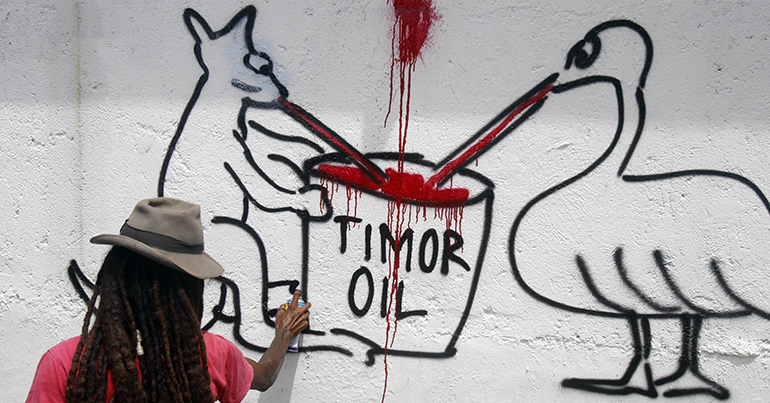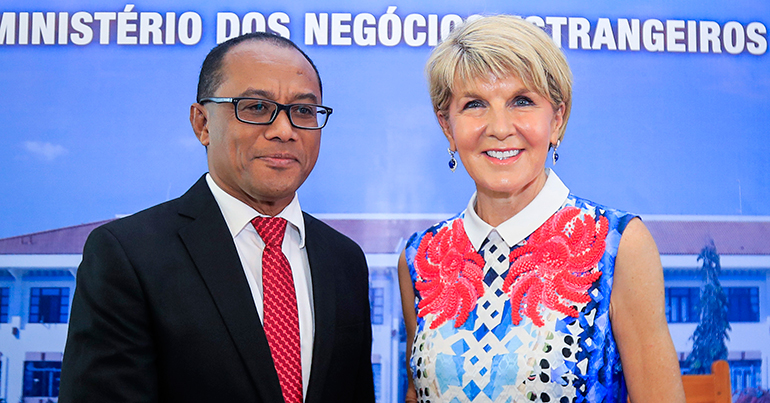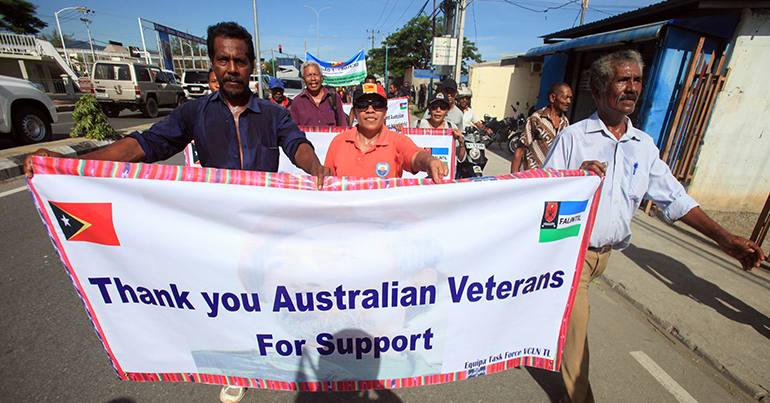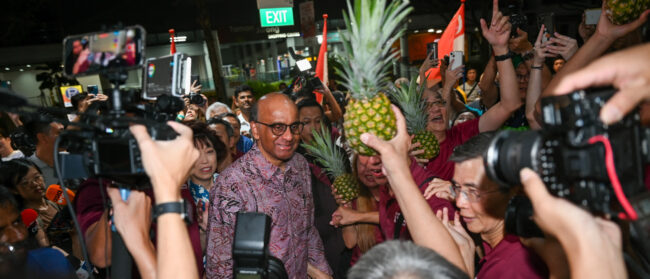The three-day visit began the minister’s ten-day tour of Timor-Leste, Malaysia, Singapore and Indonesia, and came just months after the signing of a maritime boundary treaty bringing an end to the protracted Timor Sea dispute between Australia and Timor-Leste.
But a press conference on 30 July highlighted a host of new issues and priorities between the neighbouring countries now that the maritime boundary is drawn, including Timor-Leste’s flagging economy and pending bid to join the Association of Southeast Asian Nations (Asean).
In the brief joint press conference between Bishop and Timor-Leste’s new minister for foreign affairs, Dionísio Babo Soares, the pair stressed their nations’ support for one another and promised a “new chapter” for the bilateral relationship.
“The historic signing of the maritime boundary treaty in New York on 6 March does usher in a new [era],” Bishop said. “We have agreed to open a new chapter in our long-standing relationship.”
“We are pleased with the strong and excellent relationship we have between our two countries, which includes cooperation in many areas,” said Soares, who assumed his role in Timor-Leste’s new government just last month.

A matter of ongoing tension
But the leadup to Bishop’s visit was marred by days of protest against Australia’s decision to prosecute the whistle-blowers responsible for revealing Australia’s bugging of Timor-Leste during Timor Sea negotiations in 2004. Activists held a candlelight vigil outside Bishop’s Dili hotel on Sunday night in support of the anonymous former Australian intelligence operator known as “Witness K” and his lawyer, Bernard Collaery.
Witness K and the lawyer were charged this month with conspiring to breach section 39 of Australia’s Intelligence Services Act in relation to disclosures made about Australia’s spying, which carries a maximum term of two years’ imprisonment.
The pair revealed in 2013 that Australia had installed listening devices in Timor-Leste government buildings in Dili under the guise of an Australian foreign aid–funded refurbishment program to gain advantage in negotiations for oil and gas wealth in the Timor Sea.
The agreement resulting from the skewed negotiations split the Sunrise gas field evenly between the two nations, despite the fact that most of the reserves lay within Timor-Leste’s territory. Timor-Leste subsequently commenced an arbitration process at the International Course of Justice that set in motion this year’s treaty process and delivered a split of up to 80% of upstream revenue to Timor-Leste.
I think it’s entirely appropriate for Timor-Leste to be a member of Asean
Whether Timor-Leste will be able to unlock the untapped reserves contained within Greater Sunrise remains to be seen. Negotiations for the development of the field have stalled, with a coalition of development partners led by Australia’s Woodside Energy adamant that the only viable development options are either floating liquefied natural gas or onshore processing in Australia, due to the depth of the Timor Trough that any pipeline to Timor-Lest must cross.
But Timor-Leste will only consider onshore processing at a new plant on its southern coast, and in March accused Australia of colluding with Woodside and partners to undermine the Timor-Leste processing plan.
Drawing on the accusations on Monday, Bishop repeated that any allegations of collusion weren’t true and that the development of the field was now a matter for Timor-Leste and the joint venture development partners.
“Australia stands ready to support you in your discussion with the joint venture partners to ensure that you can find a pathway to maximise the economic potential of Timor-Leste,” Bishop said. “Greater Sunrise is a resource for you, and we are very keen for its benefits to be realised for the people of Timor-Leste.”
Bishop told the Australian Broadcasting Corporation earlier this week that the unresolved boundary between the two nations had been an ongoing concern that the signing of the treaty had finally resolved.
“The signing of our historic maritime boundary treaty this year in New York has certainly opened a new chapter in our relationship with Timor-Leste,” she said. “It was a matter of ongoing tension. It was a concern for us in terms of our relationship with Timor-Leste. Now we can get on with supporting Timor-Leste with achieving its economic potential.”
Turning the page?
The government of Timor-Leste passed its customary five-year government program last week, setting an aggressive development agenda prioritising economic growth and job creation.
It aims to create 60,000 new jobs for the estimated 51% of the population under the age of 20 and grow the economy at a rate of 7%.

Economic growth is currently 2.3% and the World Bank reports that the economy contracted by 1.8% last quarter due to curtailed state spending in a caretaker government.
But despite the government’s plan for economic growth via private sector development and Soares’ prioritising of growth, international companies are closing their doors to Timor-Leste due to the economic contraction, as reported by the Dili Weekly.
Four unnamed international companies have reportedly applied recently to the Business Registration and Verification (Serve) to close their business in Timor-Leste due to low earnings, according to the paper. Serve’s executive director, Florencio Sanches, expressed his disappointment and told the newspaper the closure of private companies was concerning because their taxes fund the public sector.
But it’s not all bad news for Timor-Leste. Bishop said on Monday she was strongly in support of the country joining Asean and confirmed she would use her influence during her Singapore meetings with Asean foreign ministers to advocate for Timor-Leste’s inclusion.
Timor-Leste’s application for membership to the group remains in limbo, with group leader Myanmar saying last year the tiny state hadn’t done enough to justify entry to the regional bloc.
“Absolutely we discussed Timor-Leste’s application to join Asean and we would most certainly support it wholeheartedly,” Bishop said of her meeting with Soares. “Even though we’re not a member of Asean, we are quite a strong advocate in relation to matters pertaining to Asean. I think it’s entirely appropriate for Timor-Leste to be a member of Asean.”

Bishop also announced an expansion to the Australian government’s Seasonal Worker Program, which has provided lucrative employment in the Australian hospitality and horticulture sectors for approximately 800 Timorese workers since 2012.
Visa requirements for the program have recently been softened, making it easier for Timorese workers to return for multiple stints without paying for several short visas.
Bishop also highlighted Australia’s New Columbo Plan, which offers Australian undergraduate students opportunities to study in the Indo-Pacific, and the Australian Award scholarship program, which provides fully funded higher-education opportunities to Timorese students.
Foreign Minister Soares, like multiple members of Timor-Leste’s new government, is a former recipient of an Australian Award.
“You as an alumnus are a shining example of what can we achieved if you spend some time studying in Australia,” Bishop told Soares, to laughter.
On its face, the relationship seems stronger than ever. New economic opportunities, the chance to close the maritime boundary book, plans for annual ministerial meetings and an event commemorating the 20th anniversary of the Australian-led Interfet landing offer new hope for a stronger relationship between the neighbours. But Bishop’s next chapter remains to be seen, and until the Greater Sunrise and Witness K issues are resolved, she may find she can’t yet turn the page.


